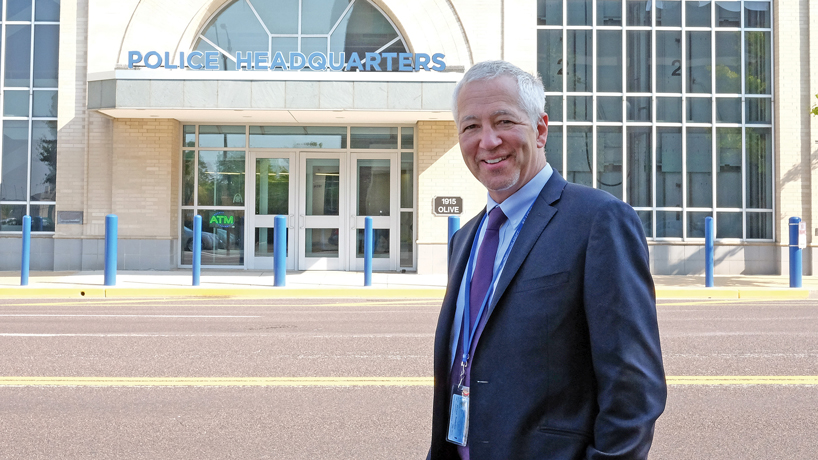
UMSL criminologist Rick Rosenfeld received a $567,473 grant from the Department of Justice to examine possible disparities in the criminal justice response to firearm-related crimes in St. Louis. (Photo by August Jennewein)
Are firearm laws in Missouri strong and consistent?
How likely is it someone arrested on a gun-related crime in St. Louis spends more than a week in jail before going to trial? How likely is it that someone convicted of a gun-related crime is sentenced to prison instead of probation?
These are questions Rick Rosenfeld, Founders Professor of Criminology and Criminal Justice at the University of Missouri–St. Louis, and his colleagues have asked for years. And now, thanks to a $567,473 grant from the Department of Justice, he will soon know the answers.
“You would think those questions would be relatively easy to answer,” Rosenfeld said. “But they are not because we lack a merged record system that would enable you to follow people from the point of arrest all the way through post-sentencing outcomes.”
The grant, which begins Jan. 1, 2016, and runs through July of 2018, will allow Rosenfeld and others to examine possible disparities in the criminal justice response to firearm-related crimes committed in St. Louis neighborhoods that differ in racial composition and socioeconomic status.
“The whole effort here is to provide information to the criminal justice system that will enable smarter decision making,” Rosenfeld said. “That doesn’t necessarily mean tougher decision making or more lenient decision making, but it means decision making based on the probable consequences for public safety.”
This partnership will bring Rosenfeld and doctoral student Josh Williams together with resources from the St. Louis Metropolitan Police Department, St. Louis City Circuit Attorney’s Office, the 22nd Circuit Court of St. Louis, Missouri Department of Corrections Division of Probation and Parole, and the Regional Justice Information Services (REJIS).
Under this project, relevant data will be extracted from police, prosecutor and court records and merged into an integrated data platform that will allow researchers and law enforcement to search and track individuals through each department.
The idea to merge the files together started with a test project conducted by Rosenfeld and Williams in which they reviewed 300 cases of a gun-related crime in St. Louis from 2011.
“One of the first things we found was that about 40 percent of arrests did not result in formal charges,” he said. “That can happen in several ways, but mostly the officer would stop a vehicle, find a firearm in the car, run the records of the individual in the car, they would all claim it’s not their gun, and the arrest would be made but charges could not be filed. That is because, under Missouri law, an individual can carry a firearm in a motor vehicle without a firearm permit.
“This project can give us a glimpse at how relaxing firearm regulations have made it difficult to prosecute.”
The preliminary study also found that, out of every 100 convictions for gun-related crimes, 62 offenders receive probation and the rest go to prison.















